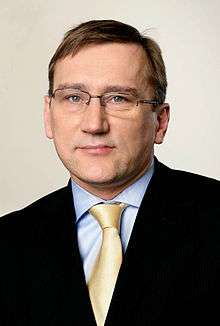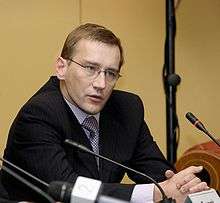Juhan Parts
| Juhan Parts | |
|---|---|
 | |
| 15th Prime Minister of Estonia | |
|
In office 10 April 2003 – 12 April 2005 | |
| President | Arnold Rüütel |
| Preceded by | Siim Kallas |
| Succeeded by | Andrus Ansip |
| Minister of Economic Affairs and Communications | |
|
In office 4 April 2007 – 26 March 2014 | |
| Prime Minister | Andrus Ansip |
| Preceded by | Edgar Savisaar |
| Succeeded by |
Urve Palo (Economic Affairs and Infrastructure) Anne Sulling (Foreign Trade and Entrepreneurship) |
| Personal details | |
| Born |
27 August 1966 Tallinn |
| Political party |
Res Publica Party (2001–2006) Pro Patria and Res Publica Union (2006–present) |
| Spouse(s) | Merle Parts (1987–2012) |
| Domestic partner | Daisy Tauk (2012–present) |
| Children | 2 |
| Alma mater | University of Tartu |
Juhan Parts (born 27 August 1966)[1] is an Estonian politician who was Prime Minister of Estonia from 2003 to 2005[2] and Minister of Economic Affairs and Communications from 2007 to 2014. Juhan Parts is a member of the Union of Pro Patria and Res Publica party.
Education
Born in Tallinn, Juhan Parts completed Gustav Adolf Grammar School in Tallinn (then Tallinn Secondary School No. 1). Afterwards, he studied law at the University of Tartu in Tartu, Estonia.
Career

After completing his university education, Parts instantly joined the Ministry of Justice. He soon became known as a young, dynamic figure who wanted to push for reforms. As an ally of Deputy Minister Mihkel Oviir, he was appointed Auditor General in the spring of 1998. He held this office until 2002. From this virtually unimpeachable office, unique in the Estonian Constitution, he frequently criticised the government and became somewhat of a popular figure in Estonian politics.
Parts became the chairman of a new party, called Res Publica, which he was instrumental in starting. It is an ideology-free, largely technocratic party which can be described as an economically liberal party of young administrators. Res Publica now is a member of the right-of-centre European People's Party organisation.
In the Riigikogu (Estonian parliament) elections in 2003, Parts surprisingly gained a majority among the right-of-centre parties, and as a result, he was charged to form a new government coalition and became Prime Minister of Estonia. The new government took office on 10 April 2003.
On 24 March 2005, Parts stepped down as Prime Minister after a vote of no confidence against Minister of Justice Ken-Marti Vaher had passed the Riigikogu. Vaher had established a quota system of how many civil servants had to be prosecuted every year (per county), which is seen as reminiscent of Stalinist purges by many Estonians, a measure that Parts had endorsed.
Parts' term as Prime Minister officially ended on 12 April 2005 when the Riigikogu confirmed his successor Andrus Ansip.
In the 2015 parliamentary election, Parts was re-elected to the parliament with 4,208 individual votes.[3]
Personal life
He has been married to judge Merle Parts and has a son, Toomas-Hendrik, and a daughter, Pille-Riin, from that marriage. He is currently involved with Daisy Tauk, a lawyer.[4]
Notes
- ↑ "Minister Juhan Parts". Ministry of Economic Affairs and Communications. Retrieved 10 February 2010.
- ↑ http://www.highbeam.com/doc/1G1-117536890.html
- ↑ "Riigikogu valimised 2015: Detailne hääletamistulemus". Vabariigi Valimiskomisjon. Retrieved 8 March 2015.
- ↑ Mihkel Kärmas (4 March 2003). "Uus uhke kosilane" (in Estonian). Eesti Ekspress. Retrieved 6 March 2007.
External links
| Wikimedia Commons has media related to Juhan Parts. |
| Political offices | ||
|---|---|---|
| Preceded by Hindrek Meri |
Auditor General of Estonia 1998–2003 |
Succeeded by Mihkel Oviir |
| Preceded by Siim Kallas |
Prime Minister of Estonia 2003–2005 |
Succeeded by Andrus Ansip |
| Preceded by Edgar Savisaar |
Minister of Economic Affairs and Communications 2007–present |
Incumbent |
